2025 CASE MANAGEMENT RESEARCH AWARD
(Honorable Mention)
PROJECT TITLE: Turning time into Hope: Advancing Cancer Care Excellence
RECIPIENTS: AL HADA ARMED FORCES HOSPITAL-TAIF
CATEGORY: Quality of Life
ABSTRACT: Cancer poses a significant threat to global health, impacting patients, families, and healthcare systems worldwide. The journey of a cancer patient is often marked by delays in diagnosis and treatment, leading to a cascade of negative consequences, including a significant impact on the prognosis of every patient. These delays can be attributed to a complex interplay of factors, ranging from limited access to healthcare, inadequate infrastructure, and a lack of awareness of systemic biases and financial constraints.
Al Hada Armed Forces Hospital identified oncology patients who face significant obstacles primarily stemming from delays in diagnosis and treatment. These delays have a profound impact on the patient’s journey, exacerbating their emotional and physical burden.
The study employed timeline mapping with cancer roadmaps and a quasi-experimental pre-and post-evaluation design to assess the effectiveness of multidisciplinary team and case management interventions. This team approach developed individualized care plans and streamlined patient pathways. The nurse-led case management team utilized evidenced-based interventions to minimize delays, improve clinical outcomes, and foster patient engagement. This includes emphasis on family involvement and use of virtual clinics for follow-up care. Education through social media engagement promotes awareness and encourages early intervention to empower cancer patients to optimize the effectiveness of the cancer care delivery system.
The project was conducted from the 1st quarter of 2023 until August 2024, generating significant improvements in the patient outcomes from the delay of diagnosis and treatment in the over-all cancer care continuum. A widely used cancer-specific patient reported outcome measure for quality of life showed remarkable improvements because of the multidisciplinary team interventions. Additional outcomes identified improved patient satisfaction and cost savings due to decreased hospital utilization.
The study highlights the crucial role of a patient navigator program in improving the oncology patient journey. By offering support, guidance, and resources, patient navigators enhance the timeliness of care, patient satisfaction, and overall quality of life. The findings advocate for the widespread implementation of such programs to ensure standardized, patient-centered oncology care across healthcare networks.
RESULTS / OUTCOMES: The data collection and analysis revealed significant improvements in various key metrics associated with cancer care. The total treatment interval from initial diagnosis to treatment initiation decreased significantly from 114.3 days (about 4 months) to 59.6 days (about 2 months). Patient satisfaction scores increased from 46% to 95%. Quality of Life scores improved from 13.1 to 25.2 after 90 days (about 3 months). The intervention resulted in an estimated $10,918,600, achieved through a combination of reduced hospital bed utilization, fewer complications and readmissions, and increased patient productivity.
These findings demonstrate the effectiveness of the multidisciplinary team and case management strategies in improving patient outcomes, streamlining processes, and generating significant cost savings.
Download and review the full RESEARCH STUDY.
